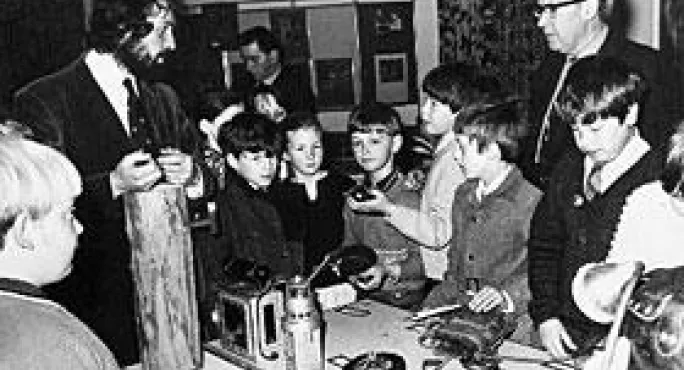Bits from the Blitz, fossils and a minibeasts box

Original paper headline: Bits from the Blitz, fossils and a box of minibeasts Record numbers of schools are making use of an innovative scheme that allows pupils to have access to thousands of objects from the National Museum of Wales. The outreach collection service, which celebrated its 60th anniversary last year, aims to inspire and educate pupils by taking samples, specimens and works of art out from behind their glass cases and into the classroom. It is one of the largest collections of its kind in Europe, with more than 15,000 items available for loan. An average of 120 schools use the service every financial year, but in the first sixth months of 2009-10 a record 134 schools borrowed items from the collection. Bryony Spurway, museum outreach collection manager, said: “To children, museums can sometimes feel like cathedrals - you have to be quiet and respectful. But the outreach collection is more accessible; it’s not something that’s completely behind a glass cabinet. “It interests and inspires them and gives them ownership because they can engage with an object in their own environment, and often they start asking questions that they wouldn’t otherwise.” Most items are small because the emphasis is on pupils being able to handle them in the classroom, although there are some larger objects. One of the most popular items is an evacuee’s suitcase from the Second World War, containing a gas mask, clothing and books. The museum also has a dedicated display space called “Treasures that Travel”, which is used for exhibiting work inspired by the collections. Next month, work by Year 5 pupils from Cardiff’s Rhydypenau Primary School will be exhibited, based on their study of nature specimens from the outreach collection. Carolyn Evans, the school’s head, said: “Teachers in particular value the artefacts that have been supplied to the school to support the curriculum. “The whole ethos strongly supports the investigatory and research skills promoted by the school. Pupils have also enjoyed experiencing aspects of the natural world first-hand.” Schools can either pay to subscribe to the service for a year, which gives them access to an unlimited number of objects from the museum’s history, archaeology, art, geology and natural sciences departments, or they can borrow individual items for a term at a time. Most of the items are originals, although replicas are commissioned if the original items cannot be found or if they are too rare or fragile. Recent additions include a “minibeasts” box containing mounted insects and spiders. Ms Spurway said: “Teachers are surprised at the size and scope of the collection. It really shows the commitment of the museum to share its artefacts for the benefit of everyone.” Welsh innovation on display Founded as the museum school service in 1949, the outreach service was one of many innovative post-war ventures to improve the country’s educational and cultural facilities. The museum’s director at the time, Sir Cyril Fox, wanted to use the museum’s resources to improve teaching and learning in the country’s grammar schools and technical colleges, as well as to give inspiration to less academic pupils. But it soon became clear that the museum’s collection would have to be expanded to meet demand, and staff were dispatched across the country to source new and duplicate specimens. The project was originally funded by a consortium of local education authorities; contributions were based on school population. The service grew steadily and by 1970 all museum departments were taking part and all LEAs were on board. The service gained international recognition, with members of staff invited to advise commonwealth countries such as India, Uganda and Nigeria on setting up their own museum education services.
Keep reading for just £1 per month
You've reached your limit of free articles this month. Subscribe for £1 per month for three months and get:
- Unlimited access to all Tes magazine content
- Exclusive subscriber-only stories
- Award-winning email newsletters



